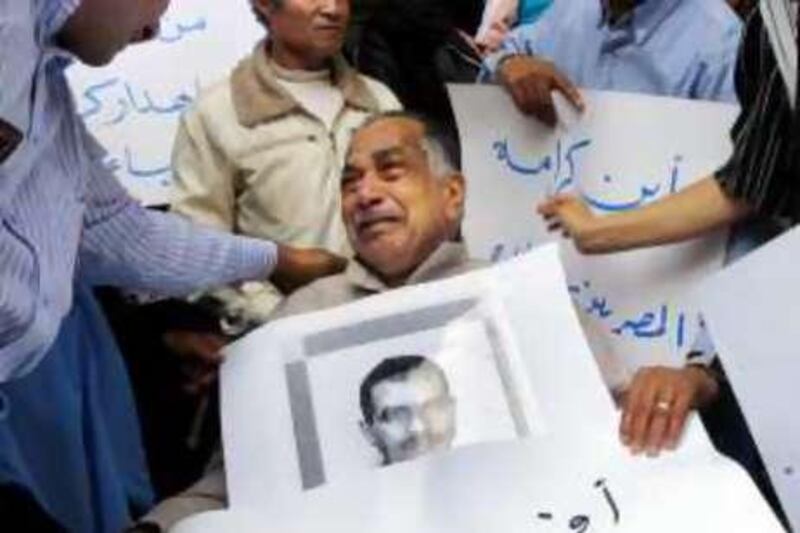JEDDAH // The Egyptian government plans to use quiet diplomacy to deal with the case of two Egyptian doctors sentenced to prison and lashes in Saudi Arabia, while the families of the two men are putting their faith in the Saudi king to secure their release. The two doctors - Raouf Amin al Arabi, 53, and Shawqi Abd Rabboh Ibrahim - were convicted last month of illegally trading pharmaceuticals in Saudi Arabia. Ibrahim was also found guilty of having affairs with his female patients.
The case has attracted huge media attention in Egypt, with Hosni Mubarak, the president, being pressured to intervene. Hossam Zaki, the Egyptian foreign ministry spokesman, said his government would not abandon the case and would continue dialogue with Saudi Arabia. He also warned the "media fuss" over the doctors could have serious consequences for their case, according to Associated Press. However, with the failure of the Egyptian government to bring back their nationals, Egyptians and the doctors' families are putting all hopes on King Abdullah to free the two doctors.
"The king is a just man and he will bring justice back to Egyptians if they can prove that the sentences are unjust," said Ahlam Salamoni, an Egyptian journalist in Saudi. "The king's doors are open, unlike the doors of the president in Egypt," she said, urging the Egyptian government to communicate with Riyadh rather than to condemn and protest. Even Arabi's wife, who said the system was unfair to her husband, believes the king can free him.
"My children want their father to return swiftly and safely," Fathiya Shehata told the Associated Press. "I hope the king will give them back their smiles." The severity of the sentences - Arabi was sentenced to 15 years and 1,050 lashes for allegedly making his Saudi sponsor's wife addicted to her pain medication and for trafficking drugs, while Ibrahim was sentenced to 20 years and 1,500 lashes for trafficking drugs and engaging in "illegitimate relations" with his female patients - is the focus of the anger about the case.
The doctors' original sentences were doubled by the Saudi court after they appealed. They will make their second appeal this week. The doctors and their families insist they are innocent and did not deserve their sentences. The Saudi government, however, said in a statement that the sentences were softer than they deserved. Egyptian media reports sparked outrage across the country, reigniting questions about the government's inability to protect Egypt nationals working overseas. However, some blame the press for provoking the situation.
"Some Egyptian channels and newspapers are using the case of the two doctors for their own agenda and not for the sake of getting justice for the two doctors," said Mrs Salamoni, the Egyptian journalist. "Egyptian newspapers in many cases abuse the freedom and independence they enjoy and they provoke people's feelings to sell more copies." Mrs Salamoni, who has been reporting in Saudi Arabia for more than 25 years, said Egyptian newspapers were "trouble makers".
Galal Fakkar, an Egyptian journalist working for the Saudi daily Arab News, said the Egyptian media was presenting the case in an emotive way. "They are using emotions, but the law has no emotions." Mr Fakkar said Egyptians were overreacting because doctors were involved. "The doctor's syndicate in Egypt is very strong and it is mobilising the entire media, but the law doesn't differentiate between a doctor and a simple worker," he said.
Mr Fakkar, who had covered legal cases for Egyptians in Saudi Arabia for the past two decades, said there were cases when Egyptians were sentenced to harsh punishments but no newspaper in Egypt bothered to report on the cases. "Only because they are doctors, everyone is angry now." Members of the Egyptian Doctors Syndicate last month gathered at their headquarters in downtown Cairo to protest the sentences of their colleagues, calling on the Saudi king to pardon the convicts. The group said the sentences were worse than death and sent a letter to Mr Mubarak calling on him to intervene.
The case has been called a "tragedy by Alaa Aswany, an Egyptian novelist. "The tragedy of the two Egyptian doctors shows the level of humiliation that Egyptians have become subjected to in and outside Egypt due to the corrupt and unjust ruling regime," he wrote in a column in Egyptian weekly El Destour. The case is also dominating discussions in cafes across both countries. In Jeddah, a group of Egyptian men sat in a quiet corner of a cafe discussing the case. One man said he did not believe everything they had read in the media.
He had faith in King Abdullah as a ruler. "He will not allow any injustice to the Egyptian doctors." * The National





